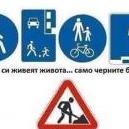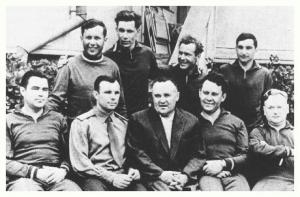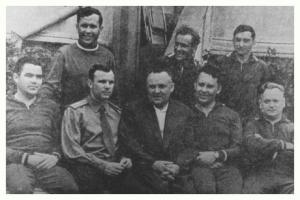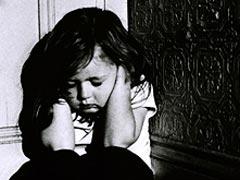-
Брой отговори
12150 -
Регистрация
-
Последен вход
-
Days Won
51
Content Type
Профили
Форуми
Библиотека
Articles
Блогове
ВСИЧКО ПУБЛИКУВАНО ОТ Skubi
-
Още в миналият век в Съюза братушките организираха на венгерските специалисти културна програма..... Аз като ми казаха, че ще сме на балет "Лебедово езеро" казах на другаря да заповяда и вместо мене да покани някой свой сътрудник или жена си.... Не не настояваше той Ти трябва да си там.....Божичкоооо 2 междучасия минимум 4 часа...Ужас за мен. Както Чърчил казва "No balet!" Все едно. Дойдоха братушките с жените, децата си и ние десетина на балет. До първото междучасие издържах. Слизаме в буфета и на мъжете почнаха да им светят очите. Беше по време на най-дивият сух закон. И шампаско само в буфета на операта, теататрът, концертните домове имаше. Всеки един си поръча по 1 шише и седнаха. Жените до тях си изядоха пастичките, пийнаха учтиво по една глътка Игристое и с децата отидоха да се ограмотяват.....Мъжете останаха по масите и от час на час само количеството шишета се увеличаваше.... Всички руски сътрудници бяха щтастливи защото благодарение на нас можаха да отидат в балетният БУФЕТ....... Сори са офа. :w00t: :w00t:
-
или http://www.youtube.com/watch?v=sx7XNb3Q9Ek&feature=related :punk:
-
Името и е чепел1. jpеg. На остров Чепел е бивщото руско военно летище в местноста Тйокол.... :post-70473-1124971712:
-
Редица тръса -4- е имало от 5.57часа 6,1 на изток 190 км от Morioka в 11,9 км дълбочина. Преди това е имало 5,7 и 4,1. След това е имало едно 5,2. :help:
-
Имаше един филф на Фурокава май където казаха на шогуна, че ще бъде победен ако гората тръкне срещу него...... Това ми дойде на ум когато гледах това как градчето тръгна..... Ужас :help:
-
Защо не продължихте с флай коктаил..... 100 сухо мартини+50 водка, лед, олива... :good:
-
Чети по-внимателно. Grigory Grigoryevich Nelyuboff :crazy_pilot:
-
Front row: A.G. Nikolayev; Y.A. Gagarin; "Vostok" chief designer S.P. Korolioff; training director Karpov; parachute trainer N.K. Nikitin. Back row: P.R. Popovich; G.G. Nelyuboff; G.S. Titov; V.F. Bykovsky. Grigory Grigoryevich Nelyuboff. се изпари. само ръката му остана на рамото на Титов. :w00t: :w00t:
-
не отдавна.....Steyr-Puch Haflinger от 50 години какво ще кажеш за този камион? Раба Ботонд резервните колелета са поставени на ос. така ако средната част седне върхо препятсвие, благодарение на тях може да продължи. същата цел е и предните две колелца. не позволяват да си забие носът..... :good:
-
Да се спрем за минута и дадем почит и на тези които живота си дали за този успешен полет.... Presumed lost in Sub-Orbital Flights Aleksei Ledovsky (Late 1957) Serenti Shiborin (February 1958) Andrei Mitkoff (January 1959) Presumed lost in a Winged Rocket-powered Aircraft Mirya Gromova (1959?) Presumed lost in Orbital Flights Piotr Dolgoff (October 11, 1960) Gennady Mikhailoff (February, 1961) Alexis Gracioff (December 1960) Alexis Belokonioff (May 15, 1962) Ivan Kachur (September 27, 1960) V. Zavadowsky Ludmila ? (1961) Presumed lost during Cosmonaut Training Valentin Bondarenko (1961) N.K. Nikitin Anatoly Tokoff Expelled from the Cosmonauts’ Corps or suddenly disappeared from the scene Valentin Filatyeff Grigory Nelyuboff (1966) Ivan Anikeyeff Mars Rofikoff Valentin Varlamoff Anatoly Kartashoff Dmitry Zaikin ей от тук Вечна им слава
-
имало е 6.4 земетресение..... Оценяването на катастрофата е издигната на най-високото. Тоест е на ниво 7. равноположно с Чернобил. :help:
-
Ще бъдат поканени и наградени всички момчета участвали в космически полети. С голямата лъжица ще ядът и водна чаша пият.... Виц. На унгарски мерната единице за земя катастрален холд е равно на 5754м2. Също Холд казват и на Луната. Навремето руснак обяснява на селянина, при полета на Гагарин. - Дедушка один Холд, фррррр. - И сочи, че е излетял. Унгареца го гледа, гледа.... -На баба ти фърчилото, на мене в 45-а 200 холда фрррррр. :tooth: :tooth:
-
Ами направили са проучване (Др. Мария Копп) м-у младежи в гимназиална, студентска и млади работещи хора възраст. При първите е 100% че искат да имат 3 деца. При студентите преодоляват 2. Но работещите (виждайки реалните възможности) обикновенно виждат за реално 1. но само след квартира, лека кола.....И преди 30 години жените средно на 23. годишна възраст са имали първо дете това сега е на 28г. вече. :post-20645-1121105496:
-
И ако бяха измили и прозорците........и през деня нямаше да има нужда от ползване на осветлението..... :w00t: :w00t: :w00t:
-
Имаме една поговорка, че има тези пари за които ако щеш има пархут косата ми. Не, не бяха толкова прости икономистите и другите лидери..... Въпросът беше да се направи пазар на излишекът от стокар капитал, на европейският терен и да се унищожи евентуалната конкуренция....Това го изпълниха стрихтно. Всичко замина по дяволите и то така, че задълженията та държавата и подъниците нарастнаха много кратно.... Чехите са отделна плячка. Те 100% си бяха под закрила на германците. Германците си изместиха всички трудоемки и мръсни технологии от Германия. Освен това направиха още в началото законът във връзка с бивщите членове и лидери на ком. партията(мисля това беше по натиск на германците)и ги виждаш къде са. Отърваха се на бърже и от словаците. Унгарците също всичко се разграби. Имаха 6 завода за захър. Това значи хиляди хектара на захарно цвекло.....Французите ги изкупуваха и затвориха....Сега няма нито един, а захарта е двойно,р тройно по-скъпа от тази в Австрия, Германия.... Заводи за олио. Имаха четири (прах за пране, съпуни, олио за консумация, итн), значи хиляди и хиляди хектара слъчоглед, репца, взеха кредит навремето и ги модернизираха. С едногодишен приход построиха петия завод, който не бачка нито един ден. Изкупиха ги демонтираха машините и сега отвъд австрийската граница бачкат и купуваме прах за пране, олио от тях....Част от тежката промишленост в словакия я пренесоха, машиностроене няма.....Мините затворени.... Преди години си пийнах с един чех и той ми каза, че Азия почвала на ческо-словашката граница..... :vertag:
-
Ако имаш роднини на село..... Въриш компоти, също манджи вурканчета, печено под мас или лой, суши плодове, гъби, зеленчуци. Правиш трошии, колбаси, сланини (пушени, солени)р винци, ракия..... И ако имаш място къде да ги съхраняваш(да не трябва скъп бензин да пътоваш всеки викенд)си спестил вече доста. Защото не ти трябвя фризър. Ако ти се яде прясно, копуваш го този ден и го готвиш с тенджера под налягане. Даже и печеното си струва да го сготвиш на половин и после да го сложиш на фурна за цвят и хрускавост. Ако переш със студена вода (модерните химикали за пране им е безразлично температурата), и се къпиш на работнато си място, тогава си спестил вече значителна сума.... от бойлера за топла вода. слагаш го на минимално(30 градуса е дост) Вечер лягаш с кокошките и изключваш и стантбай уредите.
-
Здрасти! Преди години разговарях с бразилци.....Как е при тях? Нормално хората бачкащи от две заплати си имат както при нас 1-2 рядко 3 деца....Много си имат или много богатите или безкрайно бедните. На тях им е все едно. Но завсеки случай има изградени институции (например футбол) където и бедните деца имат въвможност да се изкачат по скалерата на кариера ако имат късмет в някой талант и са упорити.... При нас (бивщите соц страни) тези институтир практики ги няма или са се забравили...Тук громоляса капитализмът с най-отвратителнато си лице. А бурокрацията, обществото не са подготвени за канализация на това.....И много не им се изка.... Прав е който казва защо той да плаща за развъждането на циганията....Друг също който казва, че ако се даде свясна работа и задача на финансово отпадналите и те могат да станат достойни работници.... Едно което ми е идеята....Но на държавата не и се прави защото......защото корупцията е минимална.... Например едно мулти ако иска да открие бизнис какво прави? Зависи пазар иска или да произвижда нещо. Но всеки случай прави ООД с минимален капитал. Понеже обещава, че ще осигори работа на 1000 работника, местната община им дава земя- която преди това я изкупува от кого? Ами от роднините на тези политици които гласували за очуждяването нали. Земата от паспище се прехвърля на промишлена зона и...... Но да плати това ООД на мултито за строежа, държавата им дава помощ чрез банката като тегли кредит за 10 години и дава на мултито 10 години без лихвен заем.....Обикновено преди да изтекат 10 години ООД мени една буква в името и пак си получава 10 години.....итн. Ти, аз като се хванем да въспитаваме, ограмотяваме поданик на държавата, каква помощ получаваш? Колко срува един дипломиран българин от люлката до дипломата(~30 години) на семейсвото си и колко един роден и оставен на воля да расти като цветенце в градината...Не може ли поне този който плаща милиони (веднъж чрез обществото и веднъж лично) да ограмоти една квалифицирана работна ръка поне данък оборлота от личните си масрафи да може да ги отбие. Казват ха имаш семеен данъкр можеш да си свалиш проценти. Да ама ако нямаш приход? Всяко дете си има кредитр с който училището го отчита към министерството. Защо не може пропорционално същата сума човек да не плаща данък оборот върху копувани продукти. Например копуваш учебниците, дрехи, тетрадки, карта за транспорт, тоест всички тези работи които са нужни -когато ходи в училище- да са със значително намаление или безплатно..... Тук ако възпиташ лекар (най-скъпо) е някъде в порядака на 15-20 000 000 форинта. Държавата слага поне толкова....И тогава не си му купил апартамент, кола и не е сигурно, че ще има работа....а е вече на около 30 години...... :good:
-
7.1 Nord-East Japan. Cunami alarma......
-
Както Чърчил казвал - Но Опера! http://www.indavideo.hu/video/Apokalipszis_most_4 :w00t: :w00t: :w00t:
-
Слушай. тук направиха законаът за даването на пари след като децата ходят редовно на училище. Понеже нямат пари училищата, общините много следят за това.... Нотариуса на една община нареди да се съкратят парите на дестина деца поради не посещаване на училище.... Пресата се завтире и от двете страни да комментира и излезе, че повечето са унгарчета (не цигани) които са били толкова бедни, че ги е било срам да ходят в училището, защото там им се подигравали другите....Сутрин от вкъщи тръгвали и после цял ден висели в полето. Вечер се връщали в къщи.... 21. Век Европа. Я да прочетем "Босоногите деца". :lac:
-
Tova namerih Termalni vodi
-
Здрасти! Специално за японците, многото записи и оцелели згради и места показва пътят по-който трябва да тръгнат. Ако успеят да отговорят добре на възникналите въпроси. както този с тръса са го решили нали доста добре с зградите издържащи без проблем даже и в порядакът на 8-9 по Рихтер. За река Тиса. Сега разглеждат на ново концепцията която отхвърлили преди 200 години заради натиска на тогавашното лоби което желаело да се придобие с огромно количество земя благодарение на която Унгария на времето след САЩ става втора в света по производство на царевица..... Но земите са изтощиха даже почна и един вид пустиня да се образува... Сега разглеждат старите карти, защото на времето реката изливала на дадена територия. След изтеглянето на водата оставащите езерца първо биват изчерпвани от рибата. После с постепенното заблатяване засявани с такива блатисти растения които обичат мнотго вода (ориз?). После пасбище до следващото наводняване. Така биват запазвани по-големите градове и местното население си имало приходи понеже тези земи са били обществени/държавни.... :book:
-
http://indavideo.hu/video/Burkas_asszonyok_elozik_a_sved_jarokeretest :whistling:
-
Един ден ще дойде едно 10 метрово цунами..... Хем те са майсторите на аикидо. Защо не се опитат да се възползват от силата на природата, вместо да се съпротивопоставят на нея... Подобно е на унгарците с реката Тиса. Последните 20 години всяка година иде вода с 1-2 см по-висока от най-високата за столетието. Реката тече между огромни посипи и всяка година ахааааа ще прилее. Винаги трябва с ужасна работа да предотварят наводнението. И то заради един погрешен принцип от преди 200 години.... Сега разработват нова концепция подобаваща на тази която природата беше правила хилядолетия преди това.... :smokeing:











